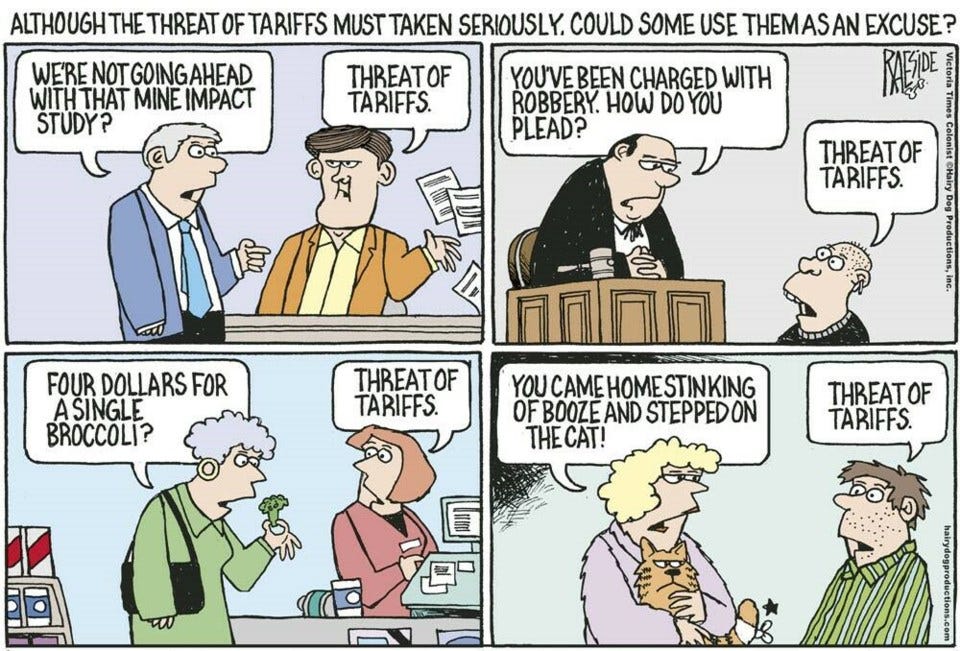Tariff Tantrums and Market Whiplash
10 Observations on Volatility, Momentum, and Staying the Course
After what had been a bad first quarter, last week posed a week of increasing challenge for investors. I am penning down some thoughts from having had some time to digest it all.
1. Volatility Is the Cost of Being Invested
You want equity returns? Learn to live with equity volatility. You can’t just have the former and not tolerate the latter. The market doesn’t owe us peace of mind. Volatility is the price you pay for superior returns over the long term. Accept it, plan for it, and stop being surprised by it.
2. The World Order Is Evolving
The world order changes every now and then. If the proposed US tariffs were to stick—as of now, it looks likely—then the world order will change with this. Everything from capital allocation, to what is considered a reasonable return, to what companies will be in vogue, to which (and how) countries will show resilience in the new world order, will all make a difference to how things shape up over the next 10 years. It will impact our financial returns.
3. Market Leadership Is Transient
Over the long term, companies like US Steel, GM, GE, Microsoft, ExxonMobil, and Apple have all held the role of the highest-valued publicly listed company in the US. Not much is common between them—they vary by industry, margins, supply chains, etc. If we believe the world is going to change, who will be the next winners? There are likely super-duper smart people who can figure all this out correctly. I can’t. If you think you can reposition your portfolio overnight for what’s going to happen, you are likely wrong.
4. The next Bull Run might be different
I might be wrong, but the decade-and-a-half bull run in a small set of companies, in a single sector, all emanating from a small geographic concentration and driven by ever-higher expansion multiples could be threatened—not because these are poorer businesses today, but because investors might find more interesting opportunities elsewhere.
5. Tariffs might just be an excuse
The market is going down a lot, but I reckon only part of it may be related to tariffs. Valuations across the board have been elevated for a while now. If investors are already cagey about where valuations are, then tariffs only provide an excuse to sell. A mutual fund operator who can’t stop hugging the market now has a reason to sell—which is a freedom they are likely exercising.
6. Momentum Doesn’t Care About Your Opinions
Momentum is very powerful. Investors sell what they think will go down. It has nothing to do with fundamentals or direct-line reasoning from cause to effect. This, in turn, sparks a vicious trend—until it stops. Selling can continue in the markets for much longer than what you think is necessary or reasonable.
7. What about Services?
It seems strange that the US—whose services comprise close to 47% of GDP—is trying to take on the world order to protect the 21% of GDP that’s in the goods economy. It’s bizarre not because goods are less than half of services, but because the world’s retaliation will likely come in the services side.
What if other countries start applying tariffs on advertising (affecting Facebook and Google), or on cloud services (affecting Amazon, Microsoft, and Google), or on a myriad of other services? I’m guessing Trump either hasn’t thought about it—or more likely has been assured that’s out of the question, given how dominant these companies are in these fields. But is it truly a moat that can’t be penetrated?
8. Stay in the Game
The moment to time the markets is perhaps behind us. We don’t know how the markets will behave from here on. Unless you are absolutely dead sure the market will drop another 15–20% and have the discipline to get in when that happens, you are better off just sticking around for the ride.
If you already timed the market well—congratulations. Now get back to work figuring out how to benefit from how things go from here on.
9. Asset Allocation > Greed
It is in times like these that prudent asset allocation makes you a winner. If you had a bit of your wealth in bonds, or gold, or real estate, or maybe in private businesses, you’re likely to wake up feeling a lot less miserable than those with all their money concentrated in stocks that have fallen.
That, in turn, will allow you to continue on your investing journey, whereas others might be tempted to do something—and that could be fatal.
An investor with a well-hedged portfolio expecting to make 7% will likely make 7–9% in the long run. An investor greedy for a 15% return may only end up with a 6% long-term performance.
10. This Too Shall Pass
Don’t sweat any of this too much. There is more to life than just a few percentage points of return.
In any case, if you have a disciplined approach to personal finance, you’ll be okay—even though the world around us seems to be collapsing. If you don’t have a disciplined approach, find some help to get you there. That kind of decision-making will likely leave you in a better position than trying to make decisions under uncertainty.
On my end, I’m not changing much in my approach to wealth building.
Disclaimer: I am not your financial advisor and bear no fiduciary responsibility. This post is only for educational and entertainment purposes. Do your own due diligence before investing in any securities. I may hold or enter into, a position in any of the stocks mentioned above. The above is NOT a solicitation to either buy or sell the securities listed in this post.





